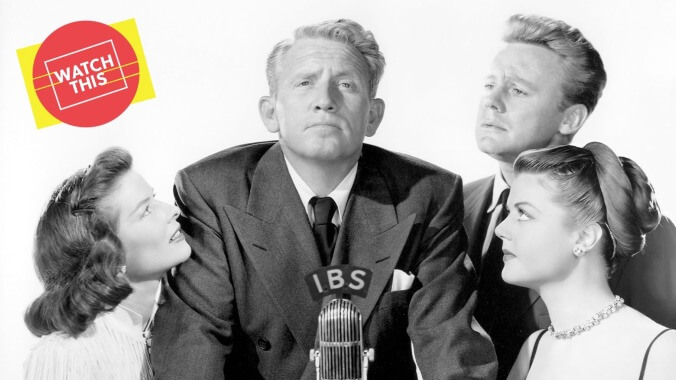Not even Frank Capra could be totally optimistic about politics

Watch This offers movie recommendations inspired by new releases, premieres, current events, or occasionally just our own inscrutable whims. This week: With Jon Stewart’s Irresistible headed for home-viewing platforms—and with November 3 on the horizon—we’re looking back at other films about elections or political campaigns.
State Of The Union (1948)
Frank Capra always sided with the everyman, the hard-working guy in the street, the quintessential American. Even when he traded the salt-of-the-earth types of You Can’t Take It With You or It’s A Wonderful Life for politics in Mr. Smith Goes To Washington or Meet John Doe, there was still an honorable character at the center played by somebody like Jimmy Stewart or Gary Cooper. Which makes Capra’s Wonderful Life follow-up, State Of The Union, an outlier. The movie pulls back the curtain on the most important race in the country—a presidential campaign—to expose a candidate who’s flawed from the get-go. This only makes it easier for him to be seduced, both literally and figuratively, into tossing his ideals aside on his ambitious climb to the White House.
Based on the Pulitzer Prize-winning 1945 play, State Of The Union quickly introduces Spencer Tracy’s Grant Matthews, a self-made aircraft tycoon who’s far from an everyman. Nevertheless, he’s described by his mistress, the conniving newspaper heiress Kaye Thorndyke (Angela Lansbury), as having the ideal “combination of sincerity and drive that the common herd will go for. They think he’s one of them. He thinks he’s one of them.” Thanks to Kaye’s fierce ambition, the noble yet adulterous Grant is soon lured into a political career, even though it means reconciling with his estranged wife, Mary (played by Tracy’s frequent co-star and longtime romantic partner Katharine Hepburn), to present a united front on a speaking tour.
Grant stays away from the smoke-filled rooms where his ambitious candidacy is plotted by hatless men in rolled-up shirtsleeves swapping favors and counting delegates. Capra shows how a nobody citizen can be turned into a somebody candidate. In 1948, with a then-unpopular Harry Truman in the Oval Office and the Democrats recently losing the House for the first time in years, Grant is gunning for the Republican candidacy. Kaye is ready to wage her entire press empire to get him elected, warning her editors to keep Dewey et al. at each others’ throats to let this “dark horse candidate” through, à la the election efforts of presidential hopeful Wendell Willkie. (The then-23-year-old Lansbury is stunning, holding her own against veteran stars like Tracy and Hepburn. Also great: heartthrob Van Johnson in a rare character role as a wise-cracking journalist.)
While Grant starts out with big ideas/ideals, he soon learns that he’s not going to be able to please all of the people all of the time. When he gets some harsh reviews from either side, he runs straight to the safe, less controversial middle, to the delight of his manipulative handlers and the horror of his honest wife. As Capra favorite Charles Lane’s character comments after reading one of Grant’s speeches, “He must be bowlegged from straddling.” That’s the moral quandary inherent in a candidacy: Is it worth doing whatever it takes to get elected, even if you drop some scruples along the way? If everyone has to make all these deals just to get their name on the ballot, do we ever elect anyone really honorable? “Don’t you want Grant to be a good president?” Hepburn’s Mary asks Adolphe Menjou, playing the main political operative behind her husband’s campaign. “Mary, a good president is one who gets elected,” he replies.
This being a Capra film, Grant doesn’t stay on the dark side long. Although temporarily blinded by the White House gleam, he eventually realizes his campaign is preying on hatred and fear, playing to the lowest common denominator—a sentiment that sounds way too familiar today. Tracy’s Grant offers some platitudes that are difficult to hear given the current political climate, especially when he says, “I forgot how quickly Americans smell out the double-dealers and the crooks.” Well, we used to, anyway. Capra’s films always held up a lofty black-and-white mirror to the way America should be (he doesn’t hold anything back here, blasting “America The Beautiful” over the opening credits), with the ultimate power hopefully belonging to the people (George Bailey) and not the corrupt fat cats (Mr. Potter). It’s an ideal we took a horrible turn from in the last election, which makes State Of The Union a valuable if dated reminder of what this country is supposed to stand for.
Availability: State Of The Union is available to purchase digitally from Amazon, VUDU, and Fandango.